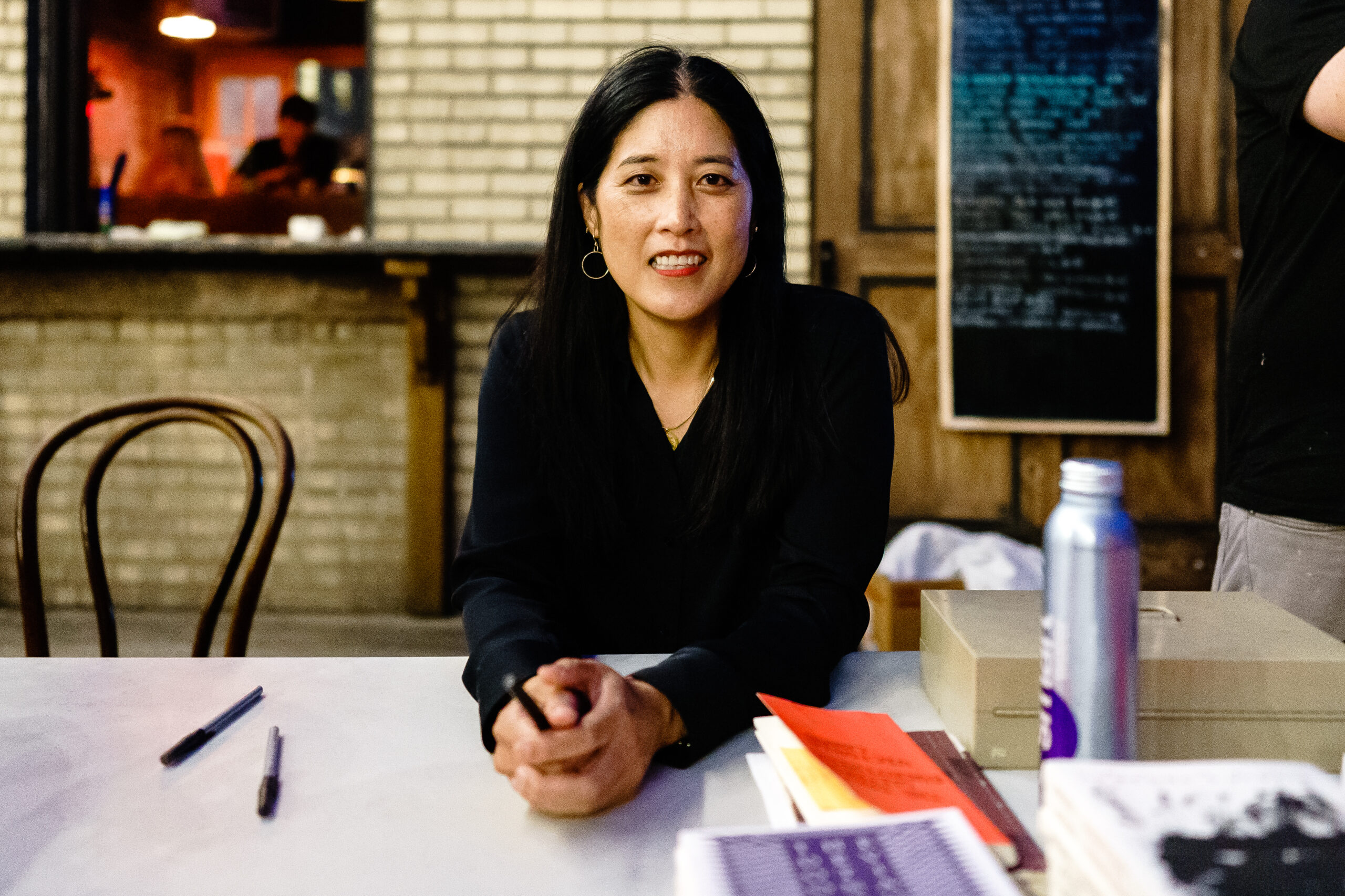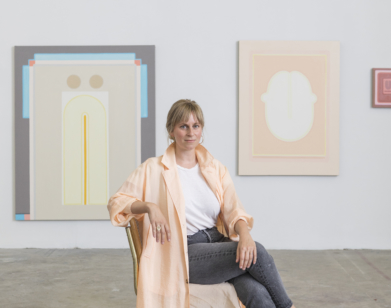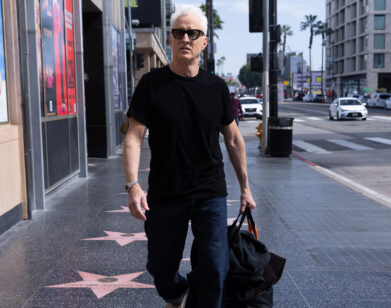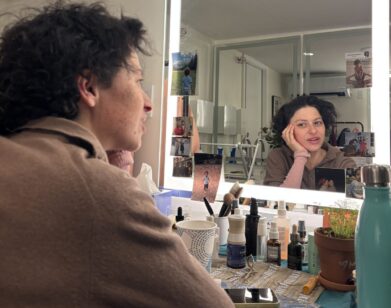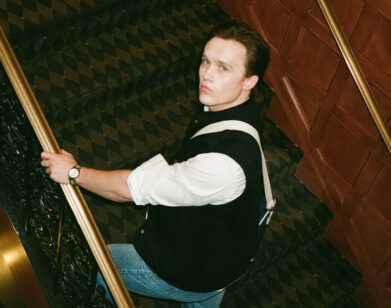LIT
How the Work of Agnes Martin Inspired Victoria Chang’s New Book of Poems
I’ve yet to connect with the paintings of Agnes Martin. I’m a cheap date—pitifully drawn to the figurative, and, until now, sort of alienated by Martin’s abstract assemblages of lines, bands, stripes, and grids. Recently, I confessed as much to the poet Victoria Chang, whose seventh collection, With My Back to the World, is a dialogue toward Martin’s life and art, as well as a meditation on solitude, loneliness, depression, and spectacle. Like I did, Chang harmonized first with Martin’s writings and her story—the silent child; the solitary woman; the artist who fled fame in New York to live off the grid—before finding herself astonished by Martin’s work.
I first encountered Chang’s poetry with the publication of 2017’s Barbie Chang. But, like a lot of readers, what hooked me was her landmark series of lyric obituaries (gathered in 2020’s OBIT), which hit like a bomb a few weeks into lockdown. Despite their highly particular elegies—mourning subjects like Chang’s father’s frontal lobe, his gait, her mother’s logic, and language itself—the poems seemed to me to hold a mirror to our collective terror and trauma in that period of uncertainty and global loss.
In her latest book, Chang’s gaze travels further out—toward Martin and New Mexico, to the limitless skies above Wyoming and On Kawara’s sense of time, into a place where the “first person ran / away like a horse”—in order to dive deeper inward. “I’ve wanted,” she writes, “to be the painting, not the painter.” Sometimes, of course, we don’t get to choose. Shortly before her book’s publication, on one of the first clear days of spring, we met over Zoom.
———
JAMIE HOOD: Hi, Victoria. How are you?
VICTORIA CHANG: I’m doing well. How about you?
HOOD: Good. It’s nice to meet you.
CHANG: You too. Where are you based?
HOOD: I’m in Brooklyn. You just got in?
CHANG: I just got in and am just giddy at the weather. You must be so happy today.
HOOD: I know, it’s finally gorgeous here! I wanted to start with the origin story of the book. You mentioned that one was Agnes Martin’s On a Clear Day. 1973, which was commissioned by MoMA. Where did this book begin and when did you know you were writing it?
CHANG: I love the origin stories of any creative project. And I love thinking about how people start different series. That is fascinating to me. The MoMA asked me to write a poem on anything in their whole museum. I tried looking around on their site, but I just got overwhelmed, and so then I reversed my thinking and thought, well, “What artists would be interesting?” I had read Agnes Martin’s writings a long time ago. It’s a book that’s really hard to find. There are many things that she wrote about that resonated with me because she has this very Buddhist mindset. That’s my relationship with life and art and poetry, too. Then I remembered that she had left New York. She’d become more and more well-known. She just gave her paintbrushes away, and said, “Give these to some younger people who might need them.” I just loved that instinct. I picked On a Clear Day. Then, once I wrote that poem, I just felt like, “Wow, my relationship with this visual art is so different than it used to be.” Then I just kept on going. I did a ton of research on her work and tried to see her work as much as I could.
HOOD: I feel like there are several people right now writing about Agnes Martin. Did you read JoAnna Novak’s book Contradiction Days?
CHANG: No, I haven’t read it, but I met her once a long time ago. She had been working on this book of prose that was also [about] her relationship with Agnes Martin. We must’ve been working on it at the same time. And then a long time ago, my friend Brian Teare wrote a book of poems talking to Agnes Martin and her pieces. I think that’s what really amazing art does. It’s like, this big door that everyone can enter. And no one owns that work. From my understanding, JoAnna Novak is writing about it through motherhood. I’m a mother, but I’m so beyond those early years. I have teenagers, so I’m at a different phase in my life, and that’s how I connect with her work and her grids.
HOOD: As you were in the process of writing, how did the relationship with Agnes Martin morph? I’m very fascinated by process. I’m also thinking about the way that the book ends with this unsettling encounter with a man who stands next to you in front of one of the paintings and you’re seeing yourself in the reflection in the glass. He shows up and then he speaks and the voice is Agnes’s. Obviously, she’s the central interlocutor in the book. But you’re not engaging at a remove.
CHANG: Totally. I just read everything I could and looked at everything I could, got really clear and beautiful colored plates of her work, read all the books, all the biographies. I saved the video of her talking and painting until the very end. I just wanted to have my imagination of what she was like and build that relationship with her. When I finally watched that film where she’s painting and talking at the same time, I remember bursting into tears. I had built up this very intimate and private and personal relationship with her, her writing, and her visual art. By the time I actually met her in body and in voice, I was very connected with her. I don’t know if anyone else would say this about me, but I’ve always felt that there’s a lot of performance when you’re building relationships with people. I love having these relationships where it’s not with a real person and I can immerse myself in that relationship and conversation. I really felt like I needed someone to talk to.
HOOD: I think that’s what drew me to writing. And it’s true for so many artists, this connection to art that almost supersedes or supplants the social. Importantly, this is also a book about depression. At times you’re talking about solitude and loneliness as separate things, and sometimes they become conflated with and bound up in this depressive feeling. You mentioned that, at times, you connect with art more than you do with people.
CHANG: It’s funny, I didn’t really know how depressed I was until I started writing these poems. Then I said to myself, “Well, don’t skirt around these issues, just write the word down.” I forced myself to write that word down “depression,” and once I did, I just found myself not afraid to write it again and again. I didn’t feel embarrassed or ashamed about it anymore. A lot of us experience extreme sadness many times in our lives. And for some people, it’s a constant thread throughout their lives. For me, this particular time was way worse than it normally is, because of all the caretaking that I had been doing for my parents who were so ill for so long. And then, I was reaching a different chemical stage in my bodily life that was surprising. I didn’t even understand what was happening. One of my friends was like, “Hey, are you okay?” He said he felt the book was really, really dark. I had forgotten that it was so dark, or I didn’t think of it as being dark. It was so cathartic and intellectually stimulating to explore the topic of depression through the work of Agnes Martin.
HOOD: To my sense, your last four books work in a cycle, but With My Back to the World feels as if it’s departing from those themes. One of the things I found so fascinating about what you’re doing here is talking about what language itself does and how it connects, for example, to depression, to solitariness, to loneliness. This book is so much about form and what poetry does, how it does it, and what it’s good for.
CHANG: And also what it can’t do. Language is so unsatisfactory. You can’t really ever get to the thing that you’re feeling with language. You can get as close as you can. I experienced this when I was trying to write about my mother’s death and my grief. I just knew I was not able to succeed. I tried again and again and again and again through those little obituaries. So this book is trying to talk about the inadequacies of language. In many ways, Agnes Martin’s pieces are writing. It’s a form of scratching on paper in the same way that I’m scratching on paper. It’s just that her language is the grid or the band or color.
HOOD: As writers, I think we must speak to those insufficiencies, particularly in so politically polarized and precarious a moment. There’s an idea that you always have to be absolutely immovable in your opinions, and if anyone challenges you, you double down and argue your way further into that hole. It’s very difficult to admit to the gaps.
CHANG: And in fact, maybe not knowing is a form of knowing. I was just talking to my friend about this yesterday. He said, “I’m really not sure poetry is always the best place for certainty or righteousness.” And I was like, “I totally agree.” I think poetry and art are navigating the unknown and the inadequacies of knowledge. It’s the opposite of knowledge. It’s not knowing what you’re going to say before you say it, it’s not knowing where you’re going to arrive when you’re done. It’s about discovery, not certainty. It’s a really difficult time, for me, as an artist, because I find the certainty in people’s stances about everything, even things I totally agree with, creeping into their art. For me, that’s the opposite of art. I don’t know anything. And by the time I’m done, I’m still not going to know anything, but I feel really joyful about the process of imagination and creation. I have no issue with everybody else and how they decide to make their art or navigate the literary world. But this is where I’d like to stay, in the space of the unknown and the uncertain.
HOOD: Art as the place where you get to to defamiliarize yourself, to have an experience of unknowingness.
CHANG: Absolutely. Destabilize yourself and surprise yourself through language.
HOOD: I was talking to my therapist about this recently. When the writing is really good, it disorients and displaces you. There’s something about the way your encounter with art is or should be about a removal from or a distortion of ego.
CHANG: When you’re writing about yourself and the work, you fundamentally understand that you’re not transcribing your experience, you’re actually distorting the experience. That’s when the art gets interesting. If you go in with the idea that you’re just there to depict, replicate, and delineate your experience, I find that to be uninteresting. That’s why people can work on their art, whatever it is, and feel like they’re underwater for the whole day. 15 hours have passed and nothing mattered but being in that space of creation and writing. I get the most excited when I have no idea what time is anymore.
HOOD: In your poem “Today,” you write, “I heard my own voice describing my fall onto a knob, how I lost my left eye, how I refused to die. And then I saw myself bend over to look at me. My own hand grabbed my hand, but I couldn’t feel it or move my eye. I saw myself for who I was; evil, full of syllables. Poets are useless.” That last bit–”poets are useless”–is borrowed from H.D.’s experimental epic Trilogy. Her reading, I think, is couched in irony, but yours feels more earnest, and also more resigned. I was wondering, in your sense, what is the use value of poetry? Should it have a use value?
CHANG: For me, poetry is naturally political because it’s a form of agency, it’s an utterance. But that’s where my idea of poetry ends. Rita Dove said, “Poetry is language at its most distilled and most powerful.” Audre Lorde said, “Poetry is the skeleton architecture of our lives.” And Gwendolyn Brooks said, “Poetry is life distilled.” Mahmoud Darwish said, “I see poetry as spiritual medicine.” There are so many of these definitions of poetry, which just tells me that it’s literally undefinable. For me, it’s the only way to get at our life experience and what we’re feeling inside. I think that all art forms do that, but there’s something about poetry, the economy of language, that isn’t really like anything else. It’s trying to use the fewest words to get at the biggest emotions. I was reading Sylvia Plath on the way in because I’m teaching a class shortly. She’s amazing. She’s very practical. She’s a thesaurus. She just sat with a little thesaurus looking at words. In her poems from the end of her life, she didn’t use the thesaurus, but I think the thesaurus was already in her body. She just was a word lover. She was very interested in putting really weird words right next to each other. That, to me, is poetry.
HOOD: I saw you announce the Sylvia Path class, which of course I was thrilled about. I feel like she’s one of those literary godmothers people want you to be really embarrassed about, but I love Plath. At the end of her life, you see that economy of language. It cuts like a knife. I could just talk about Plath all day.
CHANG: Me too.
HOOD: I was also thinking about the idea of witness and bearing witness. Jumping back to where we started, On a Clear Day, the commission by MoMA, is also a poem that is partly about the 2021 shootings at the Atlanta spas. You’re not particularly explicit about these events, but they run through a number of the poems. The book is also reckoning with spectacularity, being seen, the pleasure and also the danger of it.
CHANG: We’re in that culture now, for better or for worse. I find that to be so bizarre. I think hiding is very difficult in our culture, and yet we put our work out there in the form of a book. In poetry, it’s more attention than what you expected, and then everyone’s staring at you. I’m just the electric wire or conduit the poems traveled through. Yet today, we all want to be seen and looked at. But then I’m like, “Well, what is the cost of being seen and heard?” I think this book is also very feminist. What does it mean to be a person that looks like me? And what’s my relationship with being seen? When I was younger, being seen was a terrible thing. I was totally bullied in the white community that I grew up in, so lurking around and hiding around corners was my preferred way of being. Now everybody wants you to say something about everything. And if you don’t say something about everything, then somehow you’re a bad person.
HOOD: That was exactly why I was drawn to literature and writing, because I’ve always found it difficult to present myself socially. Writing was a way of doing that.
CHANG: That’s right. If you have attention, it’s a positive thing. If your book gets attention, it’s a great thing. And it’s just so bizarre because it never feels that great. It never quite lives up to what you’re supposed to feel because your anxiety is just heightened. Writing is the main way in which I feel like I can survive. And it’s actually the main way I am able to live. And I think if I didn’t write, I don’t know how I would live. That’s my relationship with writing. When I’m not making things, I start to feel like my life is meaningless, and then I start to feel very unmoored. I know a lot of people who aren’t this way. They find joy in other aspects of life. For me, this is it.
HOOD: I feel the same way.
CHANG: I think a lot of us do. It saves us.

